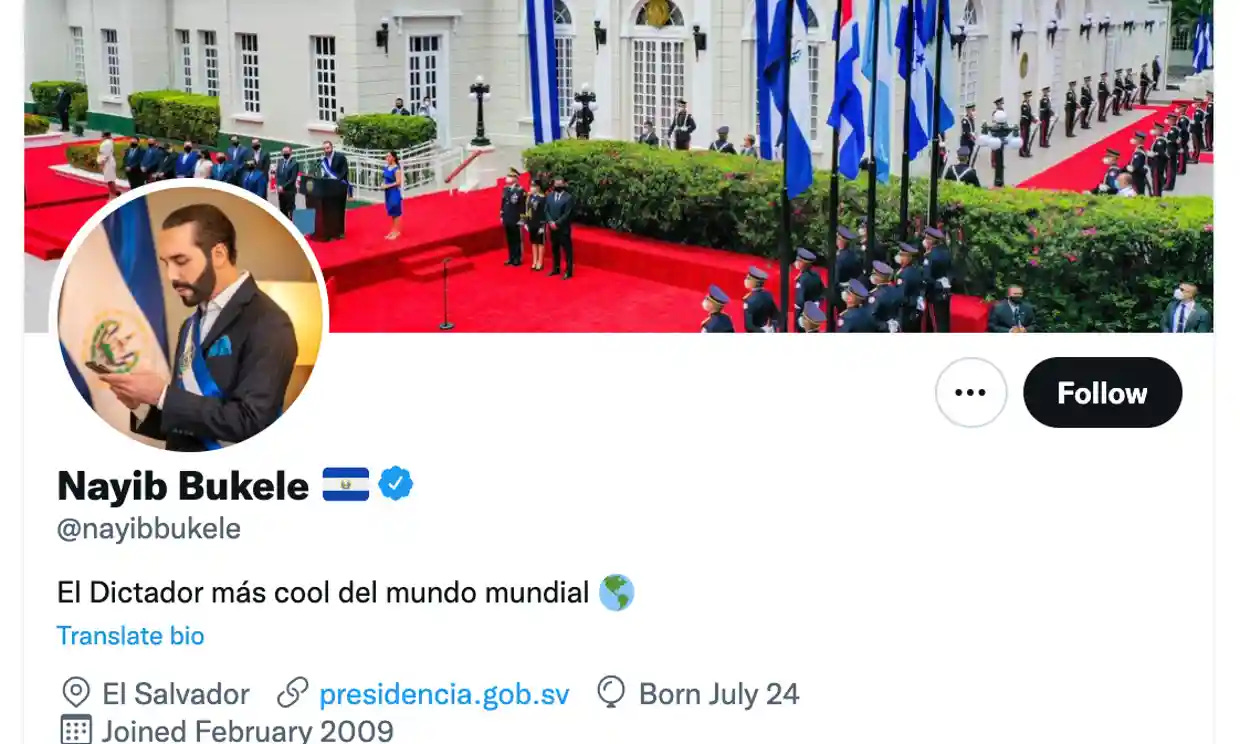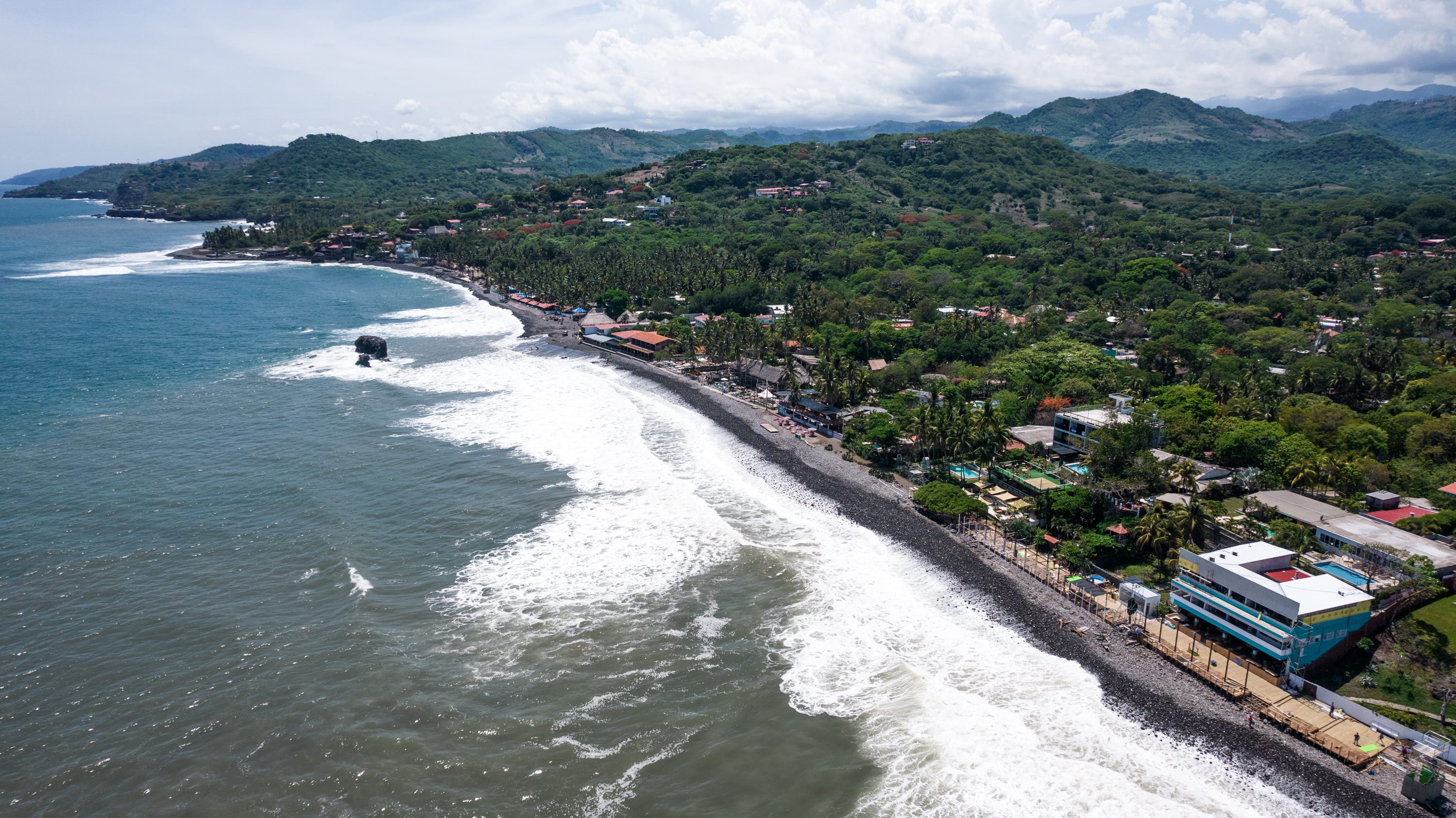The world’s “coolest dictator” wants you to surf in El Salvador
Surf City—the 21km stretch of refurbished coastline—has become a centrepiece of Nayib Bukele’s authoritarian presidency.

Over the past few weeks, the world’s top surfers have flocked to El Salvador’s stunning coastline to take part in some of the sport’s biggest events.
The events, which include an Olympic qualifier and a World Surf League pro tour event, are among the feature attractions of Surf City—the 21km stretch of refurbished coastline that has become a centrepiece of President Nayib Bukele’s authoritarian presidency.
Bukele won the February 2019 presidential election with 53 percent of the vote, benefitting from popular anger over gang violence and corruption among ruling elites. He became the first candidate to win the presidency since the end of the Salvadoran Civil War (1979-92) who did not represent either of the major two parties. He brought corruption charges against the unpopular traditional political parties and brought gang violence and homicide rates to a historic low, albeit through increasingly authoritarian means.
He was also, perhaps, the first politician to also make surfing a central tenant of his presidency.
Since taking office in June 2019, Bukele has embarked on a series of development projects meant to attract surf tourism and clean up the country’s image. Part of that effort is Surf City—a multi-million-dollar investment to improve infrastructure, including roads and highways, and build a boardwalk and public spaces along the coast to lure avid amateurs and professional surfers alike.
By investing heavily in infrastructure and partnering with high-profile surfing events, Bukele is attempting to position El Salvador as a premier surfing destination, thereby attracting a steady influx of tourists and bolstering the nation's economy. The tourism ministry estimated in December 2020 that Surf City create 500,000 jobs and bring $4 billion to the country’s tourism sector over 10 years.
Yet, lurking beneath the surface of this ambitious endeavor are growing concerns regarding Bukele's track record on human rights and democratic governance. The much-touted project has taken place amid increasing authoritarianism and curtailment of civil liberties.
In 2020, Bukele arrived at the Legislative Assembly flanked by armed soldiers—despite being barred from doing so by the 1992 peace accord—in an attempt to “bully” legislators to approve a loan for the security forces. The following year, his government summarily dismissed and replaced Supreme Court judges they disagreed with and passed laws dismissing hundreds of judges and prosecutors. The Supreme Court has since allowed President Bukele to run for re-election, despite a constitutional prohibition on immediate re-election.
That same year, he updated his Twitter bio to “The coolest dictator in the world.”
Despite his attempts to overhaul democratic institutions and undermine civil society, Bukele remains exceedingly popular in El Salvador. His approval rating has not dropped below 75 percent since taking office and reached an all-time high of 90 percent in February 2023. The primary reason behind Bukele’s popularity is the dramatic drop in violence that El Salvador has experienced since he took office.
According to The Economist, El Salvador had the highest murder rate in the world (106 per 100,000 people) in 2015. However, by 2022, official government figures claimed the figure had dropped to 7.8 per 100,000 people, putting El Salvador on par with the United States. While the decrease it significant, it is also worth noting that the government changed the way it reported on killings, excluding cases in which police officers were reported to have killed alleged gang members in confrontations.
Gang violence remains a significant issue for El Salvador. In 2021, the Office of the United Nations High Commissioner for Refugees reported 71,500 internally displaced people while more than 153,000 Salvadorans sought asylum in other countries, mainly due to incidences of gang violence. Reports have also claimed that Bukele was in secret negotiations with the country’s top three gangs and that when negotiations collapsed with the notorious MS-13 gang, it led to triggered a wave of violence in March 2022 that led to the highest homicide number in years—87 murders in three days.
The attacks were ruthless and were seemingly orchestrated to send a message to Bukele. Gangsters even left a corpse on the road leading to Surf City.
Bukele responded by declaring a state of emergency that suspended some basic rights. He also expanded the use of pretrial detention and approved legislation that allows law enforcement to imprison minors as young as 12. According to Human Rights Watch, over 60,000 people were detained under the state of emergency between March-December 2022.
In January 2023, Bukele inaugurated the “terrorist-confinement prison” near the San Vicente volcano. He claimed it can hold 40,000 prisoners, which is twice the capacity of Egypt’s new prison in the Sinai and far exceeds infamous facilities such as New York’s Rikers Island or Turkey’s Marmara prison. Yet the space is far smaller. According to Financial Times calculations, if Bukele’s mega-prison reaches maximum capacity, each prisoner would have just 0.6 square metres of space within shared cells. This falls far below acceptable standards for humane treatment.
Bukele’s authoritarian tactics have also left their mark on Surf City. According to reports, the project has displaced some of the local communities that it claimed to support. This is in sharp contrast to the carefully-crafted image that Bukele has presented of Surf City. The project features prominently on El Salvador’s official tourism website and boasts an “emblematic surfing community” and abundant nightlife.
While Bukele continues to incorporate surfing into his government policy, he has also co-opted the International Surfing Association (ISA), the sport’s official governing body, in his plans. The ISA hosted the 2021 World Surfing Games—an event that contributed towards qualification for the delayed Tokyo Games—in Surf City in May 2021. Bukele attended the opening ceremony, where he gave a speech declaring surfing a part of El Salvador’s “destiny.”
"A couple years ago we decided that El Salvador had to build a new future," he said. "To change all the things that we suffered in the past we had to build a new destiny. As strange as it sounds, we decided that surfing would be part of that destiny. Surfing is one of the pillars of our future.”
Bukele also implored attending athletes to be ambassadors and “get the word out, to post pictures on your Instagram, to tell the story of what you found here and what you think about it.”
His strategy appears to have worked. This year, El Salvador will host no less than six surfing events. It hosted the ISA World Longboard Championships in May, the 2023 ISA World Surf Games and the WSL El Salvador Pro in June, as well as the Longboard clic in September and a stage of the Latin American Pro tour in November.
“They trusted us and it’s a dream come true, we couldn’t have the best waves in the world anymore without anyone knowing about it” said Morena Valdez, El Salvador’s Minister of Tourism. “We’re married (to the ISA).”
With the tourism industry providing a potential lifeline for El Salvador's struggling economy, the president's focus on surfing as a government policy is not without merit. However, the contentious nature of Bukele's rule, combined with a deteriorating human rights situation, has cast a shadow over the picturesque beaches and the aspirations of those seeking to capitalize on their natural beauty.
As the surf continues to rise in El Salvador, so too does the debate surrounding the president's motives, leaving both the future of tourism and the nation's democratic foundations hanging in the balance.
Sports Politika is a newsletter about the intersection of sports and politics. If you like what you see, upgrade to a paid subscription ( or gift a subscription if you already have your own). We would appreciate if you could also like the post and let us know what you think in the comment section below.





Glad to see you writing about Bukele and his disgusting policies
Where were you when Salvadorians were extorted, murdered and maimed by the gangs that previous governments fail to control. A president that was duly elected is not a dictator and, if the country decides in the ballot boxes that they want one more period with this president, it is their prerogative. The country also elected to give qualified majority to the legislative assembly to have the power to clean up the corrupt judicial system instituted by ARENA (National Republican Alliance Party) in cahoots with the failed FMLN.